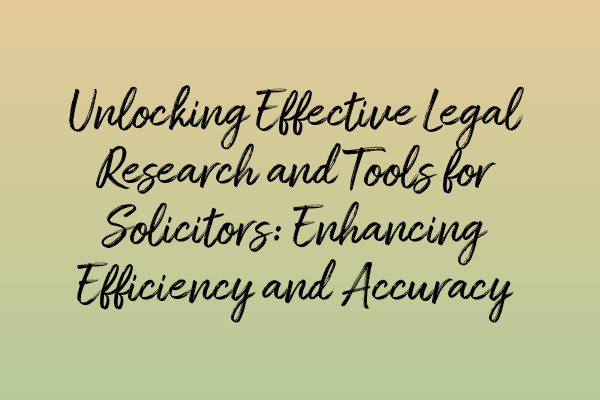Unlocking Effective Legal Research and Tools for Solicitors: Enhancing Efficiency and Accuracy
As solicitors, our success hinges on the meticulous research we conduct and the accuracy of the information we provide to clients. In an era where information is abundant and readily available, it is crucial for us to leverage the right tools and techniques to enhance our efficiency and precision in legal research.
In this blog post, we will explore the various aspects of unlocking effective legal research and the tools that can assist us in achieving this goal.
1. The Importance of Effective Legal Research
Before we delve into the tools and techniques, it is essential to understand why effective legal research is paramount. Legal research forms the foundation of our work as solicitors. It enables us to find applicable laws, statutes, case precedents, and legal commentary that are relevant to our clients’ cases.
By conducting in-depth legal research, we gain a comprehensive understanding of the legal landscape, which enables us to provide accurate and informed advice to our clients. Effective legal research allows us to:
– Identify relevant legal authorities and precedents
– Understand the legal arguments in a particular case
– Analyze and interpret complex legal issues
– Build strong legal arguments in support of our clients’ cases
2. Utilizing Online Databases and Search Engines
In the digital age, online databases and search engines have become indispensable tools for solicitors. They offer a wealth of legal information, enabling us to conduct thorough research with ease. Here are some popular online databases and search engines:
– LexisNexis: A comprehensive legal database that provides access to case law, legislation, and legal commentary.
– Westlaw: An online legal research service that offers a vast collection of legal resources, including case law, statutes, and secondary sources.
– Google Scholar: A specialized search engine that focuses on scholarly literature, including legal opinions and articles.
By utilizing these online resources effectively, solicitors can save valuable time and access accurate and up-to-date legal information.
3. Legal Research Tools for Efficiency
In addition to online databases and search engines, there are several legal research tools specifically designed to enhance efficiency and accuracy. These tools offer advanced functionalities that streamline the research process and provide valuable insights. Here are some examples:
– Case analysis tools: These tools leverage machine learning and natural language processing to analyze case law and identify relevant authority. They can help solicitors quickly identify key cases, understand judicial reasoning, and find the most persuasive precedents.
– Annotated statutes: Annotated statutes provide additional commentary, explanations, and case law references alongside the statutory text. They help solicitors interpret and apply statutes effectively, saving time and avoiding potential misinterpretations.
– Legal research platforms: These platforms combine various legal resources, such as case law, statutes, regulations, and secondary sources, into a single interface. They offer advanced search functionalities and collaborative features, making legal research more efficient and seamless.
4. Staying Up-to-Date with Legal Developments
Legal research is an ongoing process that requires solicitors to stay updated with the latest legal developments. By staying informed, we can provide the most relevant and accurate advice to our clients. Here are some strategies for staying up-to-date:
– Legal news websites: Regularly visit reputable legal news websites to stay informed about recent court decisions, legislative changes, and noteworthy legal developments.
– Professional associations and networks: Participate in professional associations and networks to engage in discussions, attend seminars, and access resources that promote continuous learning and knowledge sharing.
– Newsletters and legal publications: Subscribe to newsletters and legal publications that provide concise summaries and analysis of recent legal developments. This saves time and ensures that solicitors are aware of key changes in the legal landscape.
In conclusion, unlocking effective legal research is crucial for solicitors to enhance efficiency and accuracy. By utilizing online databases, search engines, and legal research tools, solicitors can streamline their research process and provide accurate and informed advice to clients. Staying up-to-date with legal developments ensures that solicitors are well-equipped to handle their clients’ cases successfully.
For more resources and insights related to legal research, check out the following articles:
– SQE Prep Made Easy: Strategies and Resources
– SQE Prep: Tips and Tricks to Excel in Criminal Law
– Terrorism and Criminal Law: Balancing National Security with Justice
– Cross-Examination Techniques: Mastering the Art of Questioning
– Private Prosecutions: Exploring Non-Governmental Prosecutions in Criminal Cases
Keep exploring, learning, and utilizing the right tools to unlock the full potential of your legal research capabilities.


Leave a Reply